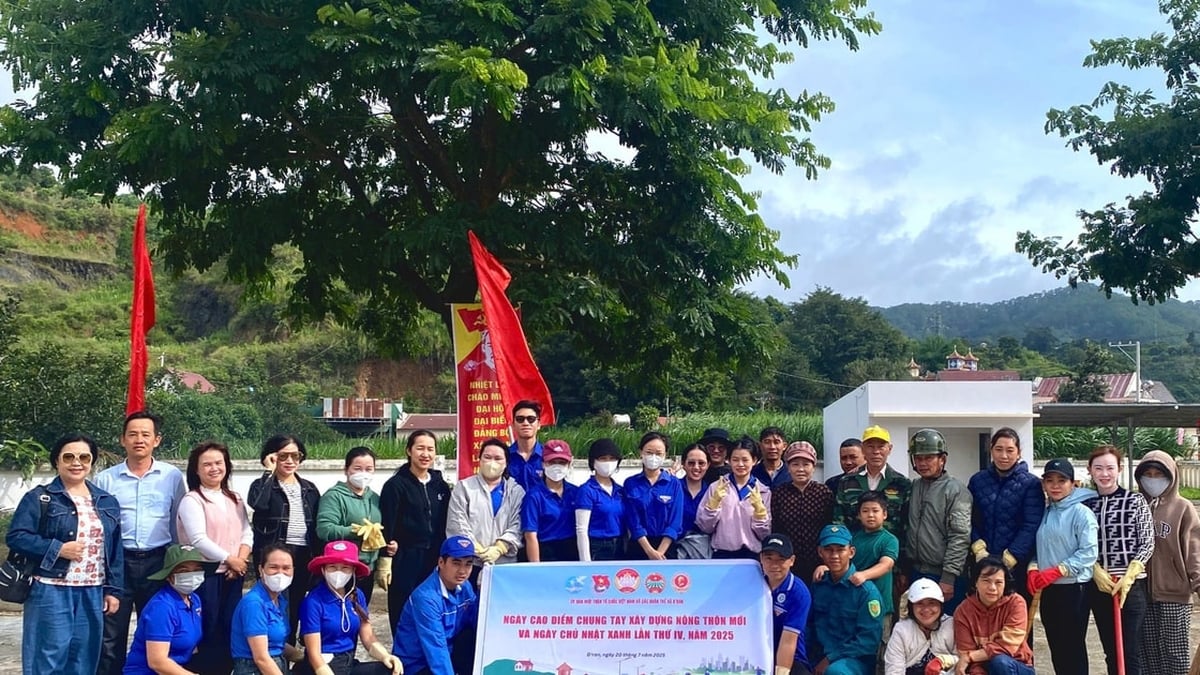Many changes in the 2024 Land Law affect land finance
The Ministry of Finance said that the 2024 Land Law, passed by the 15th National Assembly at the 5th Extraordinary Session on January 18, 2024, has made major changes related to land finance and assigned the Government to detail a number of contents on land finance; including contents on land use fees and land rent.
The main changes of the 2024 Land Law affecting land finance include: (i) Expanding the cases in which the State leases land and pays annual land rent to ensure the stability and sustainability of state budget revenue from land; (ii) More specific regulations on cases of land recovery for socio -economic development for national and public interests; (iii) Regulations separating cases of land use rights auctions and bidding for selection of investors using land; regulations on multi-purpose land and collection of financial obligations for this type of land; (iv) Eliminating the Government's land price framework; The regulation on the Land Price List is built according to the area, location or built for each land plot on the basis of the value zone, standard land plot (for areas with digital cadastral maps and land price database) for the first time to be announced and applied from January 1, 2026 and adjusted, amended and supplemented annually (instead of 5 years as in the 2013 Land Law), and at the same time expands the cases of applying the Land Price List to calculate financial obligations on land; accordingly, the land price for calculating land use fees and land rents of households and individuals when the State allocates land, leases land, or recognizes land use rights is the land price on the Land Price List (abolishing the regulation on calculating according to specific land prices in some cases as before); (v) Decentralize the authority to decide on specific land prices to the Chairman of the District People's Committee in cases of land allocation, land lease, and permission to change land use purposes under the authority of the District People's Committee as prescribed in Clause 2 and Clause 4, Article 123 of the 2024 Land Law; (vi) Innovate the land price calculation process: In case of applying land prices in the land price list to calculate land use fees and land rents, the People's Committee at the competent level must record the land price in the decision on land allocation, land lease, permission to change land use purposes, extension of land use rights, adjustment of land use duration, and change of land use form; In case of determining specific land prices to calculate land use fees and land rents, the People's Committee at the competent level must issue a land price decision within no more than 180 days from the time of land price determination; (vii) In cases of exemption from land use fees and land rent, it is not necessary to carry out procedures for determining land prices and calculating exempted land use fees and land rent. Land users exempted from land use fees and land rent do not have to carry out procedures to request exemption from land use fees and land rent, etc.
To specify the new provisions of the 2024 Land Law, the issuance of a Government Decree detailing land use fees and land rents has a legal basis.
Need to perfect policies to suit new reality
The Ministry of Finance said that the policy on collecting land use fees and land rents is part of the land finance policy. Over the past time, along with the land finance policy in general, the policy on collecting land use fees and land rents has been gradually institutionalized according to the principles of market, transparency, and equality among economic sectors; contributing to encouraging the economical and effective use of land, gradually limiting speculation and wasteful use of land, contributing to orienting and encouraging the development of the real estate market. In addition to the important results achieved, the regulations on land use fees and land rents guiding the 2013 Land Law also revealed some shortcomings and limitations that need to be overcome.
To review and summarize the implementation of policies on land use fee collection, land rent collection, and water surface rent collection according to the 2013 Land Law, the Ministry of Finance issued Official Dispatch No. 8335/BTC-QLCS dated July 28, 2021 to the People's Committees of provinces and centrally run cities requesting an assessment of the implementation of policies on land use fee collection, land rent collection, and water surface rent collection and recommendations and proposals on contents that need to be amended and supplemented to these policies.
Based on the synthesis of reports from localities, there are some problems related to:
Collecting land use fees and land rent when changing land use purposes in cases where economic organizations legally receive transfers of land use rights according to land laws to implement investment projects because according to current law, it is necessary to establish a compensation and site clearance plan (assumption) to compare with the highest amount of money (that the organization has paid to receive the transfer of land use rights and land rent rights) deducted from land use fees and land rent; this creates additional administrative procedures; in addition, there are no regulations on handling cases of receiving transfers of many types of land and then changing the purpose to implement investment projects using land in a mixed form.
Regarding the principle of exemption and reduction of land use fees and land rent (land allocation and land lease through auction are exempted or reduced or not; in the case of land allocation for resettlement when the State reclaims land, are land use fees exempted or reduced? Post-inspection and handling of violations after exemption and reduction of land use fees and land rent are not yet specifically regulated).
Problems with the area to determine the subjects and the level of exemption and reduction of land use fees for subjects eligible for land use fee incentives when being allocated land or having land use rights recognized because there are currently regulations on the List of investment incentive areas according to district-level areas, but in the district-level areas, there are communes that are not in areas with difficult socio-economic conditions or district-level areas that are not in the list of preferential areas but have communes or villages in preferential areas, it is unclear how the calculation of incentives by area is implemented.
Regarding land use fee collection and land rent collection when detailed construction planning is adjusted many times, changing the criteria such as the basis for calculating land use fee collection and land rent, changing or not changing; land before planning adjustment is land allocated and leased through the form of land use rights auction.
There are no specific regulations on deducting compensation and site clearance for each type of project with mixed land use; how to calculate compensation and site clearance refund in cases of land allocation without land use fee collection, land allocation exempted from land use fee.
Regulations on transitional handling are lacking in some practical cases,....
Accordingly, the Ministry of Finance has compiled, evaluated and sent documents to the Ministry of Natural Resources and Environment for research and completion of the draft in the process of developing the 2024 Land Law. At the same time, the Ministry of Finance finds it necessary to complete (replace the Decrees guiding the 2013 Land Law mentioned above) to resolve issues arising in the process of implementing the current Decrees on land use fee collection and land rent collection (Decree No. 45/2014/ND-CP, Decree No. 46/2014/ND-CP, Decree No. 135/2016/ND-CP, Decree No. 123/2017/ND-CP of the Government) to suit the new reality, reform administrative procedures, ensure effective mobilization of land use fee and land rent revenue into the state budget; contribute to promoting effective land exploitation and use, contributing to socio-economic development.
On regulations on exemption and reduction of land rent
The Ministry of Finance said that, in principle, exemption and reduction of land rent: The 2024 Land Law does not specifically stipulate what is exemption of land rent and what is reduction of land rent. However, throughout the process of drafting the Land Law and expressed in the design of the articles on cases where auctions and bidding for projects using land must be carried out, the principle is shown: Exemption of land rent is allowing land users not to pay land rent for the entire lease term; the rest is land rent reduction. Therefore, in Articles 39 and 40 of the draft Decree, regulations on exemption and reduction of land rent are based on the principle: (i) Exemption of land rent is allowing land users not to pay land rent for the entire lease term; (ii) Reduction of land rent is allowing land users not to pay a specific amount calculated as a percentage (%) of the payable land rent.
Regarding cases of land rent exemption: Clause 1 and Clause 2, Article 157 of the 2024 Land Law specifically stipulate cases of exemption and reduction of land use fees and land rent; at the same time, it stipulates the authority of the Government to stipulate other cases of exemption and reduction of land use fees and land rent not specified in Clause 1, Article 157 after receiving the consent of the National Assembly Standing Committee. Therefore, the Draft Decree specifically stipulates cases of land rent exemption; designs land rent reduction levels according to investment incentive sectors and investment incentive locations according to the provisions of the law on investment, which are basically similar to the current regulations in Decree No. 46/2014/ND-CP (amended and supplemented in Decree No. 135/2016/ND-CP, Decree No. 123/2017/ND-CP).
Article 157 of the 2024 Land Law only stipulates exemption and reduction of land use fees and land rent for cases of land use for production and business purposes in investment incentive sectors or in investment incentive areas (regardless of socialized sectors as in the 2013 Land Law). Therefore, Articles 39 and 40 of the draft Decree only stipulate general regulations on preferential levels of exemption and reduction of land use fees for projects in investment incentive sectors and areas without establishing separate incentives for projects using land to build public works for business purposes (socialization).
At the same time, Clause 6, Article 50 stipulates transitional provisions for land use fees; Clause 14, Article 51 stipulates transitional provisions for land rent collection; and the provisions on preferential exemption and reduction of land rent for projects in the social sector as prescribed in Decree No. 69/2008/ND-CP dated May 30, 2008 and Decree No. 59/2014/ND-CP dated June 16, 2014 of the Government are abolished.
Procedures for exemption and reduction
Regarding the procedures for exemption and reduction: Clause 3, Article 157 of the 2024 Land Law stipulates that in cases of exemption from land use fees and land rent, it is not necessary to carry out procedures for determining land prices and calculating exempted land use fees and land rent. Land users exempted from land use fees and land rent do not have to carry out procedures to request exemption from land use fees and land rent.
Therefore, to ensure supervision of the implementation of conditions for exemption from land use fees and land rents in accordance with regulations; to ensure exemption from land use fees and land rents for the right subjects, to avoid loss of state budget revenue, to ensure the effectiveness of the state's preferential policies...), the draft Decree stipulates that exemption from land use fees and land rents is recorded in the land lease decision; at the same time, it stipulates the responsibilities of: (i) Tax authorities in calculating the amount of land use fees and land rents to be reduced, submitting to the People's Committee of the same level for a decision to recover the amount of land use fees reduced by themselves; (ii) Natural resources and environment agencies are responsible for compiling statistics and summarizing cases of land rent exemption. During the implementation process, the natural resources and environment agency shall periodically inspect, review and determine the fulfillment of the conditions for land rent exemption incentives. If it is discovered that a person who has been exempted from land rent does not satisfy the conditions for land rent exemption, it must report to the People's Committee at the same level to decide to revoke the land rent exemption and transfer the information to the tax agency to coordinate in calculating, collecting and paying the amount of land rent payable (not exempted) according to the policy and land price at the time of the land lease decision and the amount equivalent to the late payment of land rent according to the provisions of the law on tax administration.
Wisdom
Source

























![[Photo] National Assembly Chairman Tran Thanh Man visits Vietnamese Heroic Mother Ta Thi Tran](https://vphoto.vietnam.vn/thumb/1200x675/vietnam/resource/IMAGE/2025/7/20/765c0bd057dd44ad83ab89fe0255b783)








































































Comment (0)